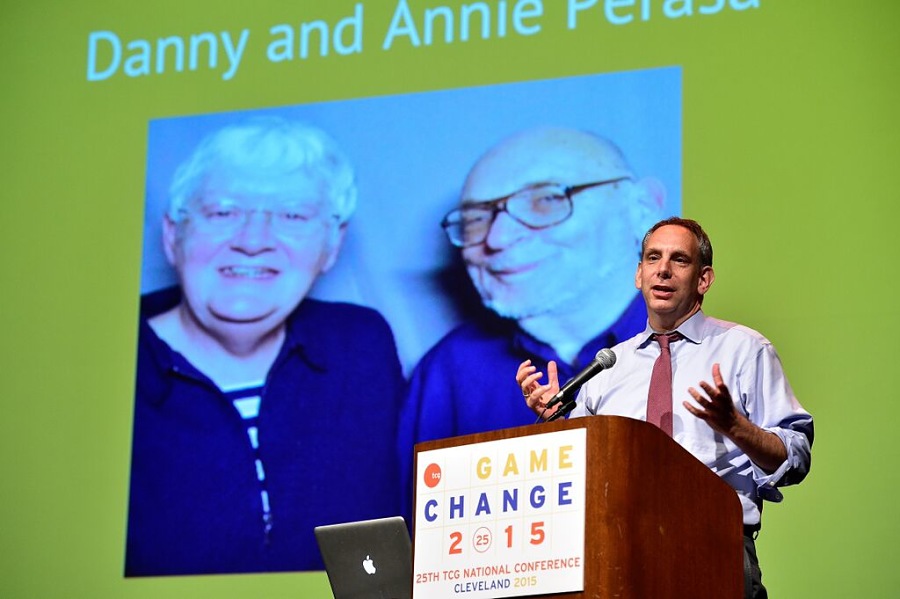CLEVELAND: The third plenary of the 2015 TCG National Theatre Conference brought together a group of attendees fresh out of lunch salons, breakout sessions, and affinity group workshops about diversity and conclusion. Theatremakers from across the nation have been sharing their stories of challenge and triumph in creating theatre for the past two days, and arrived at the plenary ripe and ready to keep the conversations moving forward.
Dafina McMillan, director of communications and conferences, kicked off the afternoon session with a sneak peek video from the TCG Legacy Leaders of Color film project. The video about diversity and inclusion showcased interviews with theatre leaders of color who created work, founded organizations, and led theatres. Some of the featured leaders were Lou Bellamy of Penumbra Theatre, Tisa Chang of Pan Asian Repertory Theatre, Jackie Taylor of Black Ensemble Theater, Woodie King Jr. of New Federal Theatre, and Luis Valdez of El Teatro Campesino.
Keynote speaker Dave Isay then brought a new conversation into the mix: Not how theatre producers, artistic directors and educators can change the game of theatre but why they should. Isay is the founder of StoryCorps, a nationwide project that collects and archives conversations from people of all backgrounds and beliefs. The interviews are broadcast weekly on National Public Radio and preserved at the American Folklife Center at the Library of Congress as part of the world’s largest oral history project. StoryCorps gives a voice to people and shows the value of listening and sharing histories— an oral tradition that resonated with a room full of people who live and work to bring stories to life on the stage.
“I do think there is a lot that we share in common—the work that you do and the work we do at StoryCorps,” Isay said. “I like to think that what we are doing every week on NPR when we do these broadcasts is that we are kind of shaking people on the shoulder with these authentic voices and reminding them that this is what is important—this is why we are alive.”
StoryCorps started with a booth in New York City’s Grand Central Terminal, where people could sit down to interview a family member, loved one, or other person in their life and share their personal histories. After receiving a 2015 TED Prize, the organization created an app that allows people to record their stories at home to be part of the StoryCorps archive.
The organization aims stir conversations and find voices from seminal moments of history: stories from the victims of 9/11, perspectives on Ferguson, accounts from those serving in the military, testimonies of LGBT people. StoryCorps approaches social justice issues with the truth.
“The end product isn’t the purpose anymore,” said Isay. “It’s the act of having people listen to each other. That is what you do all the time for so many people, in theatres like this in theatres across the country every single day of the year. I can speak for the whole country and say how grateful we are to you for bringing such joy, feeling, power, and grace to the American public.”
Isay shared a number of the StoryCorps recordings, from an elderly man saying goodbye to his wife on his deathbed to a woman reconciling with the young man who killed her son, to a witty family in Queens with a bawdy sense of humor.
One of the recordings was of a story that attendees at the conference know all too well: the pivotal moment of deciding to pursue a career in the theatre. StoryCorps’s recording is of Ricardo Pitts-Wiley sharing his life-changing moment with his son, Jonathan. Pitts-Wiley explains how he had a hard time fitting into his high school as one of very few black students. But when a teacher put him in the cast of Romeo and Juliet, he began to find his place.

“Opening night I came out onstage with fake beard, big floppy mushroom hat made of upholstery fabric that the director’s wife had made—everybody burst into laughter. What could have been a crushing moment in my life really was just something different.” Indeed, this was the moment Jonathan Pitts-Wiley discovered what he wanted to do with the rest of his life; he went on to be a playwright and director, and is now the artistic director of Mixed Magic Theater, a theatre he runs with his father, Ricardo, in Pawtucket, R.I.
“StoryCorps is so much about generosity. It’s the opposite of reality TV,” Isay said at one point. But StoryCorps recordings have one thing in common with reality TV: They are addictive for audiences. A question-and-answer section had been planned for the plenary, but was quickly dismissed by the audience, who pleaded for more of the stories to be played. Isay obliged.
The plenary concluded and attendees left the Ohio Theatre with a newfound appreciation for what they do—and perhaps a few stories brewing in their head for a new play or theatre project.


